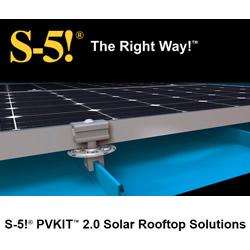KYOCERA Announces 1000-Volt Solar PV Modules
Higher voltage lowers labor and materials costs, increases system efficiency
Scottsdale, AZ – October 22, 2013 – Kyocera Solar Inc. today announced plans to offer new 1000-volt solar photovoltaic (PV) modules designed to significantly reduce labor and materials costs while simultaneously increasing overall system efficiency. U.S. electrical code was only recently amended to allow 1000-volt solar modules, following a similar development in Europe that enables wider use of high-efficiency 1000-volt inverters.
By specifying a 1000V system instead of the previous 600V standard, installers can reduce total system costs by a substantial amount � up to 20 percent, according to Kyocera engineers, depending on the individual project.
The cost reduction is achieved in several ways.
First, because 1000V PV systems incorporate more modules per string, materials and labor costs are minimized by reducing the total number of strings and combiners the system requires.
Second, string cable used for 1000V modules is thinner and uses less copper, making it less expensive to purchase and install.
Third, 1000V inverters are likewise smaller and less expensive to install than their 600V counterparts.
A more long-term advantage of the 1000V system is its ability to minimize resistive losses, also known as "voltage drop" � which is typically about 0.75 percent lower in a 1000V system than in a comparable system of 600V. This increase in efficiency results in significant energy retention over the 20+ year lifespan of a system.
"Kyocera is determined to think out of the box to bring its customers new ways to lower the cost of installing solar electric systems," said Steve Hill, president of Kyocera Solar Inc. "Offering 1000-volt modules is a great example of how we can use our current technology to save time, labor and balance of system costs while achieving efficiency improvements."
One concern about higher-voltage systems is the risk for "potential induced degradation" (PID), a phenomenon in which the power output of a solar module is reduced when exposed to high negative voltage bias between the cells and ground. In a 2012 study by the Fraunhofer Center for Silicon Photovoltaics CSP, Kyocera's modules were confirmed as PID-resistant, and did not show any degradation after being subjected to high-voltage stress testing.
Kyocera's 1000-volt PV modules are currently undergoing UL testing and will be available in 2014 in both 60-cell and 80-cell configurations.
To learn more about Kyocera Solar Solutions for both residential and commercial projects, please contact infosolar@kyocera.com or 800-223-9580.
About KYOCERA
Kyocera is one of the world's leading producers and suppliers of solar photovoltaic modules and systems. With a 38-year history of innovation in solar technology, the company is recognized as an industry pioneer and has set repeated world records in multicrystalline silicon cell efficiency. Kyocera serves thousands of residential and industrial customers in both developed and developing regions, with more than 3 gigawatts of solar collection equipment installed since 1975.
Kyocera Solar, Inc. is headquartered in Scottsdale, Arizona with regional sales affiliates in the Americas and Australia.
Kyocera Corporation (NYSE:KYO) (TOKYO:6971), the parent and global headquarters of the Kyocera Group, was founded in 1959 as a producer of fine (or "advanced") ceramics. Kyocera specializes in combining these engineered materials with other technologies to create solar power generating systems, printers, copiers, mobile phones, electronic components, semiconductor packages, cutting tools and industrial components. During the year ended March 31, 2013, the company's net sales totaled 1.28 trillion yen (approx. USD13.6 billion).
Featured Product

S-5!® PVKIT™ 2.0 Solar Rooftop Solutions
The concept of combining PV arrays with standing seam metal roofing is growing-for good reasons. Metal roofs have a life expectancy of more than 40 years. Shouldn't the mounting system last as long? With S-5! zero-penetration attachment technology and PVKIT 2.0, the solarized metal roof is the most sustainable system available -and without compromising roof warranties! PVKIT 2.0 is the also the best solution for attaching PV modules directly to any exposed fastener metal roof.
